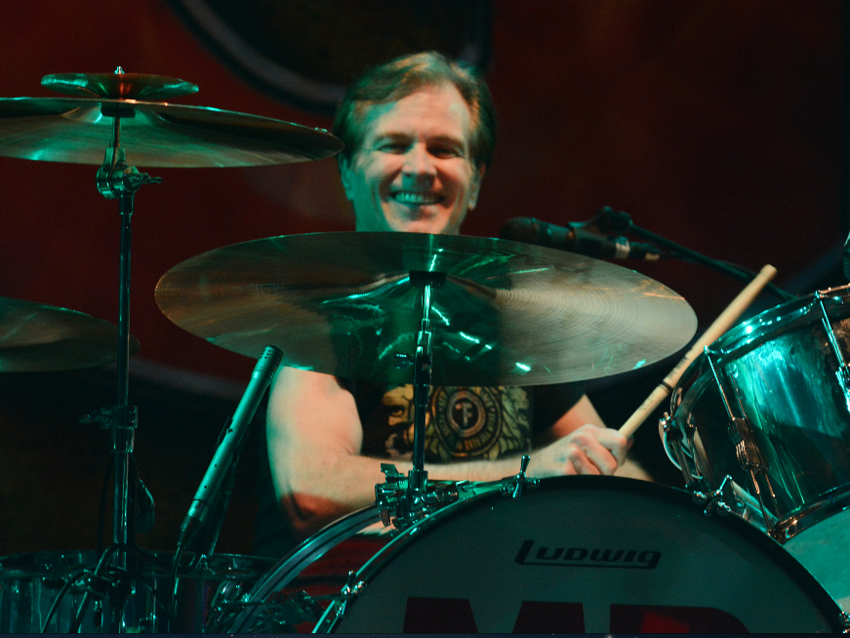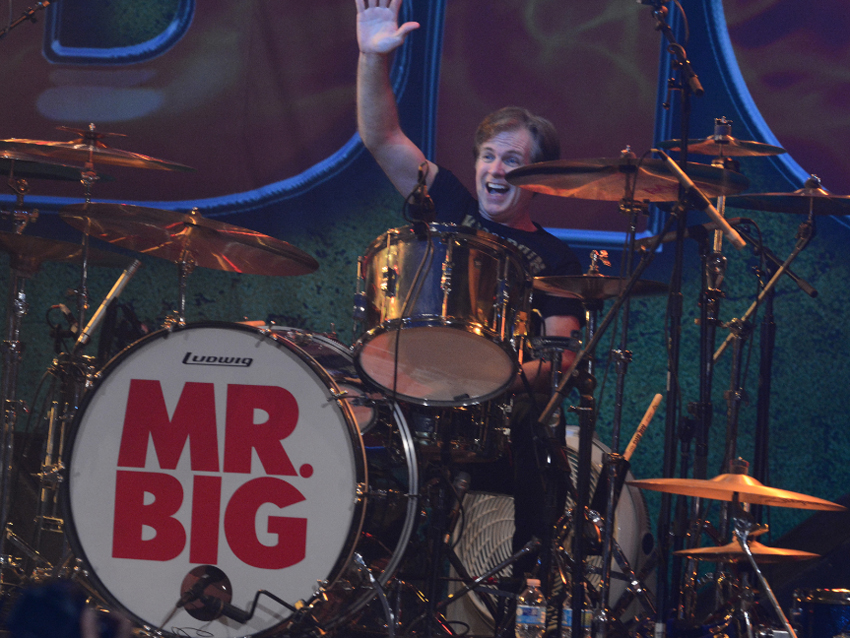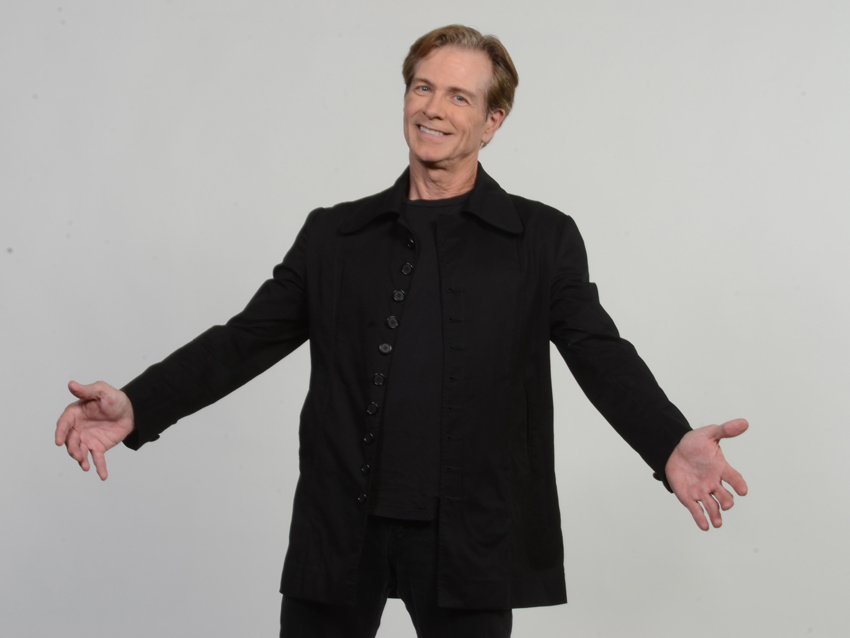
Mr. Big's Pat Torpey opens up about his Parkinson's disease
“At first, you think you’re life is over," says Mr. Big drummer Pat Torpey, talking about the news he received March 6, 2014, when he was told by a doctor that he had Parkinson's disease. "You think it on a lot of levels - there's physically, but also your sense of identity, who you are. I’ve been a drummer for 45-50 years, and suddenly it’s like, ‘Well, he used to be a drummer.’ That’s how I processed it, as if my identity was shaken. It felt taken away.”
Only it wasn't to be taken away. Although Torpey at first told his Mr. Big bandmates (singer Eric Martin, bassist Billy Sheehan and guitarist Paul Gilbert) that he would be sitting out a 2014 tour in support of the group's most recent album, ...The Stories We Could Tell, his mind was changed when they said nothing doing – either he went on the road or they weren't going. Matt Starr was chosen as the primary sticksman for the tour, and Torpey played a handful of songs behind the kit and performed the rest of the set singing and playing percussion.
In a recent blog on the Michael J. Fox Foundation For Parkinson's Research website, Torpey wrote about his condition – and the depression that followed. Torpey sat down with MusicRadar a couple of weeks ago to discuss his affliction and the progress he's making both on the kit and off, and he talked movingly about all the support he's received from his band and fans around the world.
This all started in 2008. You felt as if something was off.
“It was little things at first. Things that should have been automatic weren’t firing at first. I would look down at my foot on the bass drum pedal and think, ‘Who are you?’ It would be intermittent, so I thought that maybe my pedal was messed up or the drum head was too loose. I would start adjusting things, and of course, once you adjust one or two things, then everything else starts to get messed up.
“It was frustrating, but before long I began to realize that it was more than just an equipment issue. I knew that something else was going on.”
When did you think that you had to go to a doctor?
“I didn’t actually think that something was really wrong until two years later, in 2010. That’s when it began to affect me a lot. At first I could get by, but then I started to change the way I played things – I even played with my left foot on a double pedal. Right before we started recording What If…?, in 2010, I noticed other things. I thought my right hand was feeling weak – it wasn’t as fast as it used to be. It’s as if I was in quicksand or something.
“I went to neurologists, acupuncturists, chiropractors, GPs, back doctors, podiatrists – even a psychiatrist. Nobody really had any answers. I asked the neurologist, ‘Is this Parkinson’s?’ And he said, ‘No, you don’t have the symptoms for that.’ Finally, he said, ‘What you have is a tremor.’ It’s called ‘essential tremor.’ They do all kinds of tests for it, which are a lot of fun. This can happen to people, but usually when they’re older.”

Suspecting his diagnosis
Drummers do beat up on their bodies a bit. Did the doctor think that the tremor had something to do with drumming?
“Well, you touched on something. I also have neuropathy, which is another fuzzy thing that nobody understands fully. I have it in my ankles and feet. It can be from overuse, and let me tell you, I have done some marathon muscle memory things. My wife was like, ‘I told you you shouldn’t be doing that for an hour!’ [Laughs]
“For the tremor, they tried some medications, like beta blockers. It’s related to your adrenaline, and I remember when I would get in certain situations I could feel that tremor cooking up a little bit. I went to another neurologist for a second opinion, and he diagnosed me exactly the same.”
Even though you had Parkinson’s in the back of your mind, they couldn’t diagnose it at this early stage?
“What’s interesting is, I went to have a nerve test, and the woman who did it seemed to give off certain signals. I had mentioned that I had rotator cuff surgery, and she said, ‘No, this isn’t from a rotator cuff.’ There was something about her attitude that just said, ‘This guy has Parkinson’s.’”
When did you think that there was really something more to it?
“I didn’t stay on the beta blockers. I tried a couple of different medications, but they mostly made me feel terrible. My energy level dropped, and that’s part of the symptoms of Parkinson’s – you get fatigued easily. I am not a fatigue kind of guy; I’m usually a ball of energy. This was really unusual. And then my neurologist died. He passed away. So I stopped going to the doctor and thought, ‘OK, I’ve got essential tremor, and I’ve just got to deal with it.’
“The fatigue was getting worse and worse, and by March of 2014 it became harder and harder to deal with. It was getting very difficult to execute things on the drums. That’s when my wife said, ‘You’ve got to go to the doctor.’ I went back to the guy I originally got the second opinion from. He got all the old records from the first doctor and he showed me where he wrote down, ‘This is starting to look like Parkinson’s.’ And he’s the one who told me, ‘I think you’ve got Parkinson’s.’”
Even though we know about Michael J. Fox, who was diagnosed with Parkinson’s disease very early in his life, we tend to think of it as an older person’s affliction.
“That’s true. There was some talk when I was a kid about my grandfather having it, but I didn’t really think about it. Plus, he was an alcoholic, so when he’d get the shakes or something, I just thought, ‘Wow, he must need a drink.’”

On depression
Which wasn’t your problem – you’ve always been a pretty clean-living guy.
“Yeah, no smoking, no drinking, no drugs. That stuff was never my problem. So when the guy told me Parkinson’s, I was pretty dumbfounded. He told me that I needed to start thinking of what I wanted to do, that I had to start medications. This was on my wife’s birthday, March 6th. I didn’t want to tell her about it at first. It’s her birthday – what am I gonna say? But immediately after the diagnosis, I started to go downhill pretty fast.
“My wife did some research, and she read that some of the symptoms are you’re fatigued all the time and you get depressed. I told her, ‘I’m not depressed. I’m just bummed out.’ But she said, ‘No, you’re depressed. You’re clinically depressed.’ I didn’t even want to read about it or know about it.”
Depression’s a very tricky thing: You don’t really understand it until you go through it.
“That’s exactly and unfortunately the case. – you don’t understand it until you go through it. People pooh-pooh it – ‘C’mon, snap out of it.' And you can't. They're like, 'Oh, go get an ice cream cone or something.’ As if it's that easy. Everybody has bad days, but when the bad days just won’t end and you don’t know why, then it becomes a real issue.
“One thing I want to mention, and I talked about it in my blog, is Robin Williams. I don’t want this to be misconstrued, but when that happened, it made me think, “I don’t want to go there.’ It was so close to home for me. Here was a guy with a family, and it made me think, ‘You’re heading down that same road.’ I’m not saying that I had thoughts about checking out, but it does give you pause for thought.”
You’ve been very brave in talking about this. Did you ever think that maybe you should not share this news with your fans?
“I did, but then I knew that things were going to change and that it was going to come out. Mr. Big was getting active and we were gonna do a tour. At this point, I’d lost 30 pounds. I read a really good definition of depression: You can’t see a future. You see no reason to get out of bed. That’s how I felt.
“My wife was great. She took off work and got me to the neurologist, who that day got me in to see a psychologist. I was having trouble sleeping because of anxiety, and he prescribed me anti-anxiety medicine. He told me, ‘Look, you’ve got a family. You’ve got people who love you, so you’ve got to want to do this.’ I had those thoughts, but I couldn’t see them at first. I took the anxiety medicine, and I slept, for the first time in a long time. It was amazing. My wife was overjoyed. From there on, I built on that.”
You put out a press release about having Parkinson’s. Did you go back and forth on that?
“I did. It was hard to do the press release at first. I kept putting it off. Our manager told me, ‘Pat, we’ve really gotta do it.’ I started to analyze what was stopping me. What was the big deal? And I realized that it was fear of the unknown, that everything was gonna change. But once we did it and put the press release out, it was such a relief. I couldn’t understand what I was so worried about. Your brain can really play tricks on you.”

On his Mr. Big bandmates
And I imagine that once you put out the press release, the reaction from fans was nothing but love and support.
“Exactly. It’s been amazing, and it’s only built on that since. It’s what I didn’t think would happen.”
At first you weren’t going to tour with Mr. Big, but you did end up going on the road.
“Well, yes, but we had a guy, Matt Starr, helping out. He played most of the songs behind the kit. I played five songs. Eric and I did a lot of lead vocals together. I sang on pretty much everything, and I played a cocktail kit and percussion. I played tambourine on the songs I always wished Eric would do. The show developed to a point where I was a real part of it. It’s a real tribute to those guys, because I had given up, but they said, ‘No, no, we want you there.’”
I’m not surprised. I’ve interviewed them a bunch of times, and I’ve always known them to be real stand-up guys.
“They are. Absolutely. They’re such unique talents, and they’re like brothers. We’ve been together for 25 years and have been through a lot. It’s amazing to have such a support system. They've been truly wonderful to me.”
How are you feeling these days as far as your treatment goes?
“My Parkinson’s is pretty controllable at this point. I’m pretty grateful in how controlled it is. My son will see me have a tremor every now and then, and he’ll say, ‘Dad, you’re shaking. Stop.’ And I’m like, ‘Yeah, yeah, I know.’ [Laughs] I’m doing great. I’m sleeping and doing stuff. The drumming is compromised a bit. Funnily enough, I had to have a shoulder replacement a couple of months ago. I burned bright, but I burned out, too. [Laughs] I had a sling on for about six months. Everything’s been rebuilt, and it’s amazing how great it is. I’m getting stronger every day."
Any plans to tour with the band this year?
"Not the band touring, but Eric and I might do some unplugged performances. Right now I’m working on that. I’m drumming, but it’s baby steps.”
Are you going to be working with the Michael J. Fox Foundation?
“I have offered my services. Mike suggested that I contacted them, so that’s how I became a guest blogger. I told them I’d like to get more involved. That’s one of the things – you’ve gotta do stuff. You can’t just sit in your house. They’re seeing what kind of a fit I can be. So yes, I plan to be involved.
“I enjoy talking to people about it. When I was in Japan, people would come to our shows – there were people with some other health issues – and I’d talk to them and give them words of encouragement. They’d say to me, ‘You’re so strong. You’re our hero.’ And I’d be like, ‘Hey, it’s not me. It’s the people around me.’ It’s true. Without so many great people rooting for me, this would be a lot harder. I’ve got a ton of amazing people in my corner.”
Joe is a freelance journalist who has, over the past few decades, interviewed hundreds of guitarists for Guitar World, Guitar Player, MusicRadar and Classic Rock. He is also a former editor of Guitar World, contributing writer for Guitar Aficionado and VP of A&R for Island Records. He’s an enthusiastic guitarist, but he’s nowhere near the likes of the people he interviews. Surprisingly, his skills are more suited to the drums. If you need a drummer for your Beatles tribute band, look him up.
